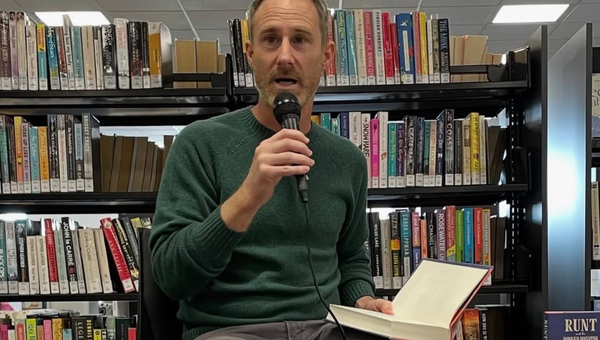SAN DIEGO — Diamanda Galás has been hailed around the world for her groundbreaking music and the sonic power and emotional intensity of her singing, not as a scientist or author.
But this San Diego-born vocal wizard of awes has devoted extended periods to researching the often-grim topics she chronicles in her harrowing but ultimately transformative art. She gives an incandescent voice to the victims of intolerance and isolation, creating gripping soundscapes by digging into the depths of their despair and shining a ray of light on those with little or no hope.
"I have to work on dark subject matter. It's not that I choose to — I'm inhabited by dark subject matter. It's part of my flesh," Galás said.
Witness her compelling new album, "Broken Gargoyles." It examines the fate of German soldiers who were shunned after being maimed and horrifically disfigured during World War I, both by injuries and by botched surgeries that followed.
The recording sessions, which took place in San Diego and New York, started in May 2020. But Galás' research and preparation for the album began in 2012, after she read "Das Fieberspital" ("The Fever Hospital") by German expressionist poet Georg Heym. By 2014, she had performed early versions of the work in Germany, Switzerland and Tasmania.
Galás brings an even greater devotion to her singing and piano playing. She approaches both with the unwavering diligence of a lifelong devotee, constantly striving to hone and extend her skills and expressive range.
"Diamanda is a singularly iconic artist. When she goes on stage or records, you hear the musical depth of her research," said University of California San Diego music professor Mark Dresser. An acclaimed bassist, composer and band leader, he met and first collaborated with her when both were UCSD students in the 1970s.
Beguile and bedevil
Galás' voice is a mighty instrument that can chill and thrill, beguile and bedevil, attack and affirm. Her singing has earned praise from such diverse admirers as Debbie Harry of Blondie, Nick Cave, PJ Harvey, Henry Rollins, former Led Zeppelin bassist John Paul Jones (with whom Galás toured and recorded in the 1990s) and composer and former UCSD professor George Lewis, who is now Columbia University's Edwin H. Case Professor of American Music.
"Once you hear Diamanda, you're not going to mistake her for anyone else," Lewis told The San Diego Union-Tribune in 2017. "Because no one is going to be able to do what she does."
Galás' meticulously disciplined singing draws from jazz, blues, country, gospel hymns, German cabaret, traditional Greek music, operatic bel canto singing and more. Her vocal palette includes blood-curdling shrieks, guttural growls and much in between.
She can, as needed, sing more than one note at a time. She is similarly adept when employing a glossolalial vocal technique, which evokes the sounds of people speaking in tongues.
Galás also uses literature, poetry, film and other mediums as sources of inspiration that inform and enrich her work. She carefully studies the languages in which she sings, which include English, German, Italian, French, Greek and more.
"Diamanda is someone who deeply has given everything to what she does," Dresser noted. "It's not a case of her being someone (who says) 'I'm sacrificing for my art.' She does what does because she has to.
"When she enters that space, she is hyper-alive and vibrant, and channels something extraordinary because she has developed this remarkable gift. It's not just a gift, it's multiple gifts, that are the result of decades of research."
The results can be transcendent whether Galás is singing about the horrific toll of the AIDS pandemic (as she did on 1988's "Plague Mass" and several other albums) or about the Turkish genocide perpetrated in the early 1900s on Armenians, Greeks and Assyrians (on her 2003 album "Defixiones: Will and Testament, Orders From the Dead.")
Her 2020 solo instrumental album, "De-Formation — Piano Variations: Das Fieberspital (The Fever Hospital)," was a prelude to "Broken Gargoyles," which clocks in at just over 42 minutes and is presented in two sections, "Mutilatus" and "Abiectio."
Galás' chilling recitation, in German, of Heym's 1912 poem, "Das Fieberspital," is juxtaposed with her anguished wordless singing and beautifully stark piano playing. These are periodically complemented by the carefully calibrated improvisations of a violist, percussionist, trombonist and synthesizer player.
Oration and incantation
"In a way the work could be called a 'radio play,' because the text reading is an oration in parts and an incantation in other parts," Galás explained of "Broken Gargoyles."
"The schrei theatre ('scream theater') coming out of the small cities of Germany indicated in its manifestoes that texts (like 'Das Fieberspital') be exhausted of their blood, stretched, declaimed, sung, shrieked, drilled, with infinite vocal possibilities. ...
"My work has nothing to do with that infantile 'spoken word" bulls---. The phrase, clearly redundant, ignores the history of Greek poetry and the lute, and is the province of imbeciles."
But creating envelope-eviscerating music that is singularly her own is only part of Galás far-reaching artistic oeuvre.
She is equally riveting when performing classic songs with searing force and startling distinction, as she most recently did on her 2017 album, "All The Way." So skillful, in fact, that in her hands these songs become something more — and very different — than the best-known versions previously done by other artists.
This holds true whether Galás is reinventing the 1957 Frank Sinatra chestnut "All the Way," the wrenching 1967 James Carr soul ballad "The Dark End of the Street," or "O Death," the haunting southern Appalachian lament first recorded in the 1920s by the banjo-playing singer "Dock" Boggs.
What all these songs share — much like Galás' own compositions — is an unflinching sense of honesty, of hearts and souls laid bare, of personal and universal suffering and, ultimately, the quest for transcendence. Were the essence of her work to be distilled to just three words, the title of the 1970 Johnny Cash song "What Is Truth" sums it up well.
"I agree. As naive and corny as that sentiment might be, that is my sentiment," said Galás, who — after decades in New York — now lives in the same Balboa Park-area home in which she grew up. Both her parents, like her brother, are now deceased.
"When I was very young, I wrote a funeral oration for someone and was criticized that I had done it to curry favor," Galás recalled. "I thought: 'Hasn't it ever occurred to you how horrible death is? And that departure is forever, and — at the same time — almost imminent? Why would I want those thoughts?'
"And once you have had those thoughts, a person is not able to shake them. So, there has to be that feeling, a feeling of terror, that inspires a lot of the subject matter in my work. The Greeks are afraid of death, so they celebrate life and have written about death since time immemorial. It's not because I'm (of) Greek (heritage) that I say this."
That Galás' singing on albums and in concert can cut and singe is a matter of record. The intensity and devotion she brings to her work reflects her take-no-prisoners views on life and the state of the world.
"She is like she sings," Dresser affirmed. "She's a super-intense person and she suffers no fools. Who she is and her persona are connected. It's not like a theatrical presentation of some other persona. That's the same person who gets on stage."
Happily for Galás and her friends, she is not always brooding.
Hank Williams and Elvis Presley
Her kitchen is often filled with flowers and she chortled when recently recalling an especially awful Pia Zadora movie she and her late brother, playwright Philip-Dimitri Galás, watched together in the early 1980s.
Her laughter exudes a sense of playful delight. She laughed heartily when her interviewer — prior to invoking "What Is Truth" — asked Galás to name her favorite Johnny Cash song. (Her choice: "Ring of Fire.")
"It is so funny you ask that question," she said.
"Because people have asked me: 'What are you going to do after this ('Broken Gargoyles') album?' And that's what's driving me crazy. Because what I want to do is the live performance of this work ... and I need a residency to be able to do that and really don't know when that will happen."
She laughed again.
"So, then I thought the next record I would do would be a Hank Williams, Johnny Paycheck and Johnny Cash record," continued Galás, whose "All The Way" album includes her blues-drenched version of Paycheck's "Pardon Me, I've Got Someone to Kill."
"It's so amazing you would ask that question about Johnny Cash, in the middle of a conversation about 'Broken Gargoyles.' And let's not forget about Elvis Presley's 'Suspicious Minds!' I have to do that one day because it's a superlative song. And no one will ever do it like Elvis."
The same can be said of Galás, who grew up playing piano in a San Diego band that featured her brother on drums and her college music professor father on trombone and bass. The jazz standards and pop and Broadway favorites they performed provided the then-teenaged Galás with stylistic counterpoints to the classical keyboard music she was intently studying.
"My father schooled me in the jazz tradition, the swing tradition and (piano greats) Fats Waller and Art Tatum," she said.
"He would yell at me in an encouraging way. I'd be playing and he'd say: '(Do it like) Fats! Fats! Come on!' And then he'd say: 'Tatum! Tatum!' And I'd say: 'Wait a minute.' Because Tatum was like a billion notes a minute!"
Galás' alternately restrained and thunderous piano playing is a perfect foil for her singing when she is not performing a cappella.
Intriguingly, she only began singing when she was in her 20s. This was in part because her father equated women who sang with prostitutes. She was largely self-taught until enrolling at UCSD, where she first studied biochemistry. Many of the advanced vocal techniques she uses are ones Galás developed on her own.
"Between 1977 and 1979 is when I started working on my voice seriously," she recalled.
"I had been playing piano in jazz bands and the saxophonists were the kings. I felt it was time for me to concentrate on my voice so that I could be king of the band. And then I went solo to become king without the band!"
Cutting-edge solo vocal performances were all but unheard of until Galás came along. The theatricality of her performances underscored the unapologetically provocative subject matter she sang about.
One of the most striking examples came with Galás' concerts in the 1980s of her AIDS-fueled "Plague Mass." It was inspired in part, by her brother's agonizing 1986 death from the disease.
During the section of "Plague Mass" entitled "There Are No More Tickets to the Funeral," Galás would sing while drenched in a blood-like substance, naked from the waist up. But what most commanded attention was the fury she brought to her singing — and her unbridled rage for those who turned their backs on the scores of people dying from AIDS.
"Diamanda was extraordinary from the beginning," Dresser said. "It was clear early on that she was a conduit for sound, and that — when she played piano or sang — she was a vehicle for something remarkable that she channeled.
"I attended her senior recital at UCSD and I had never heard or seen anything like it. I was challenged by it and I didn't really understand it at the time. But I knew I'd heard something unforgettable. And I realized that she had been transformed and that she had transcended her material."
Audio engineer, sound designer and electronic processing expert Daniel Neumann began working with Galás in 2016 and teamed with her on the first half of her "Broken Gargoyles" album.
"The sounds Diamanda produces with her voice alone pushes that very instrument far beyond established boundaries, categories and genres, yet her performance is very detailed and developed and masterful," Neumann said, via email from Santiago, Chile.
"Her voice operates on the margins of what seems possible or, sometimes, even bearable. A cathartic, disturbing expression, like terrifyingly crafted noise — that's on one end of the spectrum. On the other is bel canto (singing), with endless facets in between."
The word "cathartic' is used frequently in reviews of Galás' work. It's meant as high praise, but she has come to regard it as lazy journalism.
"It is cathartic for me," she acknowledged. "But people don't understand the meaning of the word. They think it means getting up on stage and squalling, screaming, rolling on the floor, then going off stage.
"We can see lots of those performers, but they generally don't sing for 40 years. Because if you don't know what you are doing, you won't do it for long. And this is the kind of work where you better know what you are doing."
———







